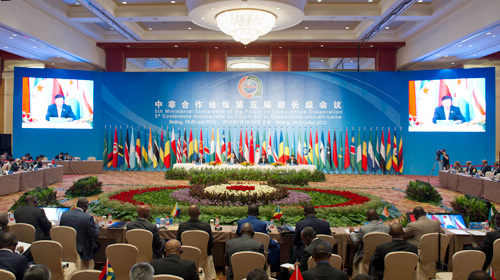|
 |
|
WORKING TOGETHER: Participants attend the Fifth Ministerial Conference of the Forum on China-Africa Cooperation in Beijing on July 19 (WANG YE) |
The 12-year period since the establishment of the Forum on China-Africa Cooperation (FOCAC) in 2000 has seen massive deepening of trade and economic cooperation between the two sides. The commitments made by China toward Africa during this time resulted in extensive infrastructure being built across the continent. The forum provides a unique opportunity for maintaining the momentum of progress.
"The forum is getting more and more important because it actually sets the stage and platform for us to meet each other to raise issues of mutual concern with regard to our relations, particularly how we can deepen our trade and investment collaborations," Alhaji Mohammed Mumuni, Foreign Minister of Ghana, told Xinhua News Agency at the Fifth Ministerial Conference of the FOCAC held from July 19 to 20 in Beijing.
At the two-day ministerial conference, implementation of follow-up activities from the Fourth Ministerial Conference of the FOCAC in 2009 was reviewed and new cooperative programs to be undertaken in the next three years were defined.
Economic driver
Since the FOCAC's establishment the African economy has grown rapidly at 4 to 6 percent overall, making the continent one of the fastest growing places in the world.
"The economic achievement of the continent is driven by both internal and external factors," Liu Hongwu, Director of Institute of African Studies with Zhejiang Normal University, told Xinhua. He noted that the most important external driving force was China. "The all-round trade cooperation between China and Africa under the FOCAC contributed a lot to African countries' efforts on poverty alleviation, social development as well as improving people's livelihood," Liu said.
The African side was also satisfied with China's role in promoting the economic development of the continent. "Trade cooperation between China and Ghana had yielded abundant mutual benefits and opportunities, especially under the umbrella of FOCAC," Mumuni said.
For example, with China's financial investment, Ghana acquired much-needed capital and technologies, created more jobs, a competitive business environment and new markets, and promoted trades. "All of these have ultimately contributed to Ghana's economic growth and poverty alleviation efforts," the minister added.
In the next three years, China pledged to expand cooperation in investment and financing to support sustainable development in Africa. "China will provide $20 billion of credit line to African countries to assist them in developing infrastructure, agriculture, manufacturing and small and medium-sized enterprises," Chinese President Hu Jintao said at the opening ceremony of the Fifth Ministerial Conference of the FOCAC.
Wu Sike, China's Special Envoy to the Middle East, believed such commitment meant that financial investment to African countries in the future would be more practical and effective as it would be mainly conducted by enterprises instead of by the government. "It is of far-reaching significance to African countries' capacity building efforts," Wu told Xinhua.
Cheng Tao, Director of the Center for African Studies of the China Foundation for International Studies, echoed Wu's sentiments. "China could help African countries realize industrialization and add value to their primary product exports, creating more jobs and enhancing their self-development capability," Cheng said.
Adjusting aid
China's determination to help African countries strengthen their self-development capability can be seen from statistics. It will launch an "African Talent Program" to train 30,000 personnel in various sectors for Africa in the next three years, 10,000 more than the total number in the past 12 years since the establishment of the FOCAC. In addition, China also pledged to offer 18,000 government scholarships, build cultural and vocational skills training facilities, and send 1,500 medical personnel to African countries in the next three years.
| 